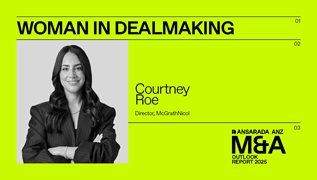The End of Not Knowing (and the end of the virtual data room)
The era of artificial intelligence spells the end of the virtual data room, but also the end of not knowing. Ansarada's Sam Riley discusses what's next.
By ansaradaFri Aug 04 2017Innovation, Virtual Data Rooms

Hand on heart, can you tell where you stand with bidders on a transaction? Why can’t the machines tell you who is engaged and who isn’t? And is more engagement from C-level execs a good or a bad thing?
How do you find out who in your data room is serious and who is just playing around?
These are just a few of the questions we sought to answer with Ai and Machine Learning – the result is something we call the AiQ Bidder Engagement Score.
The AiQ Bidder Engagement Score uses artificial intelligence to predict bidder behaviour, by determining a bidder’s alignment to behavioral patterns of successful and engaged bidders in mergers and acquisitions (M&A) deals across 57 attributes. The AiQ Bidder Engagement Score, developed with a leading data analytics company Quantium, is a machine learning algorithm trained and tested on thousands of M&A deals.
By day 7, the model is up to 97% accurate at predicting whether a bidder will complete their due diligence work and submit an offer to the seller.
This accuracy rate has been calculated on a sample of our historic deals for which we have the most accurate information. The methodology used was to look at bidders in competitive sale processes with an AiQ Bidder Engagement Score above 50% at day 7 of the full due diligence period and identify the proportion that ended up remaining engaged throughout the process plus were not assessed as dropping out prior to the binding bid date.
The AiQ Bidder Engagement Score won’t give you a crystal ball on what may happen in M&A. But it can help you make informed decisions during an M&A transaction.
Traditional data room analysis
When selling a business, company executives and their advisors, typically investment bankers, closely monitor activity in their data room. Bankers do this because they believe the level of data room engagement is a strong indicator of the likelihood of a bidder making a compelling offer for their company.
Data room activity often mirrors the interest of a potential bidder because it is related to the need to conduct due diligence. Given the cost of doing such due diligence, serious bidders of a business would not waste their time and money on such work if they weren’t contemplating making an offer.
An examination of data room activity is usually conducted along the following lines:
-
A junior banker runs reports on data room activity using simple metrics such as document views, logins and questions asked
-
A senior banker reviews the data room metrics and provides an assessment of engagement by each bidder to the company based on that senior staff member’s experience of activity levels of their previous M&A deals and the information provided to them on bidder activity outside of data room activity metrics
Problems
But such an approach has a number of problems that include:
-
The time it takes junior bankers to do their analysis, imposing an additional cost to the company and the transaction
-
The time taken to conduct data room analysis means such data suffers from being old and does not incorporate the latest developments
-
Due to practical constraints, data room analysis could only focus on a few key metrics and potentially may miss the impact of less obvious but equally important data points
-
There is no way to ascertain how to objectively determine the weight of relative importance of different metrics as the analysis relies on the subjective analysis of the senior financial advisor’s experience that is limited to the transactions they have worked on and may not be able to account for patterns in other transactions in other industries and countries that may be equally relevant
Machine learning
Each of these shortcomings can be addressed by using the AiQ Bidder Engagement Score based on machine learning that:
-
Utilizes the historic behavioral data of Ansarada data rooms
-
Is based on the latest information available from the data room
-
Determines the impact of many more obscure data points than would normally be observed by the typical manual process
-
Ignores external factors that may prejudice the analysis of data room activity
-
Combines the assessment of the bidder into an overall score
-
Delivers a score to customers automatically without the need for any additional work by the selling company or its financial advisors
Benefits
Using the AiQ Bidder Engagement Score results in the following benefits:
-
Reduces the transaction costs associated with running typical legacy data room reports while collating different metrics and interpreting their results
-
Enables those selling companies to make faster and more effective decisions in reaction of bidder behavior in the data room
-
Reduces the time during which bidders will be unengaged in a data room as this will be more quickly addressed either through identifying and then satisfying any concerns that they have or through refocusing attention toward other bidders if a particular bidder’s concerns cannot be addressed
We believe businesses and advisors who use the AiQ Bidder Engagement Score will have a significant advantage in winning deals and securing maximum advantage over those who do not. They’ll likely sleep a lot easier as well.
Either way, it’s the beginning of the end for traditional data rooms, ad-hoc storage, homegrown systems and random chat and Q&A platforms. Those with Ai-powered deal and transaction platforms will have an unfair advantage.
If you’re interested in learning more or getting a demonstration of the AiQ Bidder Engagement Score, give us a call !


